Astro Boy: Omega Factor - The Mightest GBA Game!
23/04/22
Astro Boy is kind of a weird property, in a sense. He’s the kind of character that I feel a lot of people my age and older have had exposure to, but he’s a character who’s never been super present in media for the last twenty years (outside of that kinda crap CGI movie from like 12 years ago), at least over here in the West. But I love that little guy, and the way I really got into him was through what is easily the best game I’ve found so far in The Game Boy Abyss/ We’re ten games deep into The Game Boy Abyss, and I thought it was time to play one of the games I look back mostly fondly from my days downloading far, far too many games onto a emulator; Astro Boy: Omega Factor.
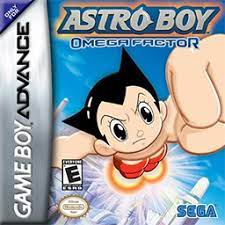
You know, overall, I haven’t really experienced that much Astro Boy content over my lifetime. I’d seen the odd episode of the 80s(?) series of the show, and half-watched a bunch of the original tv series, due to the fact my Dad watched them as he was a kid and thus bought them all on DVD. I’ve also read the entirety of the Pluto manga, which is a rough, muder mystery adaptation of Astro Boy’s “Strongest Robots in the World’ storyline. But I’ve never really dug into Astro Boy as a franchise before. Which is rather strange, considering at the age of twelve, I nonchalantly downloaded Astro Boy: Omega Factor onto my computer emulator, unaware I was going to begin what would become one of my favorite Game Boy Advance games of the time.
As a side note, I will be spoiling a major gameplay and story moment that occurs roughly halfway through the game, so be aware of that going into this review.
Astro Boy: Omega Factor has all the trappings of the classic Astro Boy origin story; Astro is built by Dr. Tenma to replace his deceased son Tobio, but abandons him after realizing that Astro simply can’t replace his son. From there, Astro is thrown into adventure after adventure, slowly coming to terms with the fact that he is the linchpin in a burgeoning human-robot conflict that will decide the fate of the very earth itself. I’m not sure if what I described was simple or complex, but Omega Factor somehow pulls off the balancing act of feeling both. Honestly, it’s less about the story, and more about the characters; the titular Omega Factor is Astro’s ability to adapt and evolve by coming into contact with new characters, and with each character Astro meets and ‘understands’, you’ll be able to upgrade your various stats. On a basic level, this game is a beat-em-up; think Streets of Rage, but with an adorable robot boy. The first half of the game is simply just this; a beat-em-up with a progression system, but the second half changes things. Progression in the second half of the game is heavily tied to meeting certain characters, or interacting with them in a certain order, but the second half of the game is very different, yet very similar to the first half. It’s still a beat-em-up, but it’s… different, but similar. You’ll see soon.
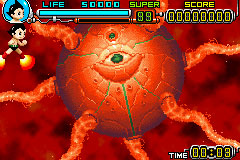
Easily my favorite aspect of this game is that it’s much more than just an Astro Boy game, so to speak; this is a celebration of everything to do with Astro Boy’s creator, Osamu Tezuka. Characters who the celebrated author created over his decades spanning career. Legendary characters like our titular hero, vaguely chaotic genius doctor Black Jack, the mythical Phoenix. It’s rare to go to a stage without running into another character who exists in Tezua’s greater canon, and this is a part of the game I think I’ve grown to love far more than the last time I’ve played this little title. It’s just as a whole a genuinely heartfelt love letter to -arguably- the most influential mangaka of all time, at least in Japan itself. In fact, it’s pushed me to explore more of Tezuka’s works - I really, really need to get into Black Jack! I mean, look at him!
On its most basic levels, Astro Boy: Omega Factor is a stage based beat-em-up. You’ll control Astro, heading across basic levels, punching, kicking, and lasering all manner of robots, goons, and bosses, trying to get to the end of each stage, with the occasional character hidden in the background or up above the normal plane of the screen. The combat is pretty basic - you’ve got your punches and kicks, a special meter that allows you to do a special charge, a devastating laser beam, or a machine gun that covers the entire screen, doing little damage but stunning everything on screen briefly. The moment to moment battles are pretty easy breezy, but the boss fights, assuming you’re not playing on easy, can provide a pretty good challenge. You’re not going to be able to just tank hits and bring them down, you have to plan your moves and attack only when they’re open. Hell, a few of the later bosses - such as The Strongest Robots in the World - feel a bit closer to mini puzzle bosses then anything else. Later in the game, the balancing can feel a little wonky, but they’re still fun, through and through. There are - seemingly - seven stages for you to run through, and at first you might wonder if the game is a little too light on content. And then, at the end of the final stage, you realize… is there a sequel? Can a game really end on such a dark note?
Seriously, Death Mask still kind of creeps me out. The framing, the vibes, it’s all just eerie in a wonderful way.
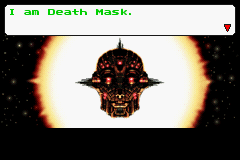
And then the game as a whole… it flips itself on its head.
Its linear progression is simply the first ‘act’ of the game, entitled Birth. After reaching the end of the game, the game will ‘reset’, with The Phoenix bestowing Astro the ability to time travel, via the hilariously aptly named Stage Select. Now, Astro has access to every stage in the game at any moment, allowing him to pick and choose which events in the timeline he wishes to intervene in, working through previous events with foreknowledge of what is to come, and what he has to do to prevent the literal end of the world. Now, the game was fun to start with, a solid if slightly by-the-numbers beat-em-up, but this twist halfway through the game continues to delight me even more than a decade after originally playing it. It’s just an incredibly silly and exciting way to play with the conventions of a stage-based beat’em up, and it’s even reflected in the story itself; Astro Boy literally tells the character he’s in such a rush that there’s ‘no time for stage select!’. And just seeing him bounce off such a wide range of characters, representing a wide spread of ideologies and moralistic alignment, it’s just a really charming direction for the majority of the cutscenes. At its heart, Omega Factor is a story of Astro Boy finding his place in the world; sure, his place involves traveling through time to create peace between humanity and robot-kind, but the very basic message is nothing short of lovely.
On that note, Pluto is the bestest, nicest boy. Is he a killing machine designed to kill all humanity? Sure. Does he want to? Hell no! What a lad!... unless you’re reading the Pluto manga.
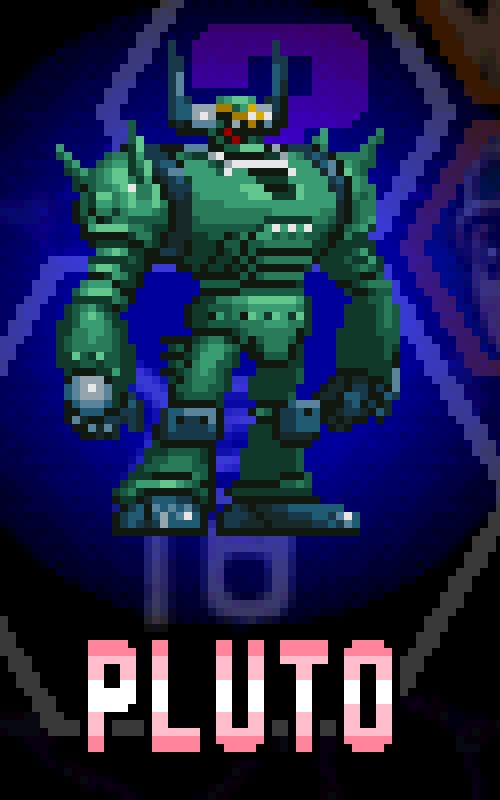
Read the Pluto manga.
Graphically, the game is a treat, featuring a crisp, sprite-based art style that features typically simple designs, but each enemy feels eye-catching and unique all on its own. The backgrounds are simply gorgeous, feeling like entire worlds just existinging in the background, waiting to be explored. Star of the show, graphically, is the bosses. There are almost universally monstrous, gigantic mechanical creatures, and the work put into their sprites and attacks is nothing short of incredible. My personal favorites were the Sun Machine in Stage 2 and the entire gauntlet of the World’s Strongest Robots in Stage 7, with the former being a monstrous being that feels almost impossible to take on, and the latter for just how much personality for each of the robots is presented in their sprites and animations. This game does a funny thing with it’s enemy sprites; there are only so many enemies to fight, so to change things up from time to time the devs simply decided to either blow the sprites up to monstrous proportions, or shrink them down to miniscule creatures, adapting their speed and damage to compensate. I’ve seen some contention online about this decision, as some feel the sprites grow too blurry and pixelated and blown up, and they aren’t really wrong. But I dunno; I find the giant sprites both hilarious and genuinely cute.
Anyway, the only real issue with the game’s story progression is that once you reach the ‘Rebirth’ section of the game, it can occasionally feel a little confusing as to which stage you have to access next to continue the storyline, or which character you haven’t added to Astro’s Omega Factor you need to hunt down. It’s not a huge problem; there was only once at the very end that I had to consult a guide briefly to check which character I’d missed, but beyond that you just need to be very thorough in hunting down all the characters to reach the final plot points. I’ll just say this, because you need to do it and you’re likely to miss it; once you’ve reached the point you can play with Stage Select, re-do the tutorial level - it’ll give you a new breadcrumb trail to follow. Trust me, you’ll thank me if you get stuck.
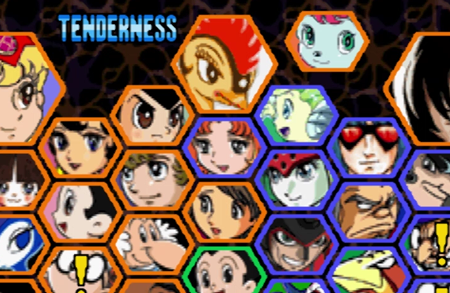
And whilst the combat is good - and don’t get me wrong, I do really enjoy it - but it’s very basic and can grow a little repetitive towards the later sections of the games. I was never bored, but there’s only so many super lasers you can spam, or how many times you can go punch-punch-punch-kick combos. It’s not bad, but I feel just another move or two could’ve helped change things up. Also, is it just me or does certain combinations of enemies or levels cause this game to chug like all hell? I genuinely think there was at least one section where the frame dropped below five FPS. Very rare, but kind of insane. I was also kind of thrown off by the game’s difficulty. Especially in the later Rebirth section, even with a maxed out Life meter, there are bosses that can kill you in a handful or - in at least once case - a single hit. There are ways to deal with this; leveling up the ‘shot’ special ability can freeze enemies for a substantial amount of time, but it still feels bad to make a mistake and just get taken down there and then. It’s kind of odd just how hard enemies hit on normal difficulty, too; it just feels like there is very little room for error in some of the later fights, and I feel this could’ve been remedied by letting Astro level up his HP a little more, or even adding a defense stat. There are more characters you can meet to level up then the amount of level up nodes actually exist. It’s just kind of odd.
Despite being a little unfair at times and a good-but-not-great battle system, Astro Boy: Omega Factor is a triumph on nearly every front. A simple, yet sweet story, a genuinely engaging, character-based level up system, and one of the greatest tributes to one of the greatest mangaka of all time all comes together into a game I’m genuinely floored in on the little ‘ol Game Boy Advance. I love this game so much, and if there’s any game of the ten I’ve featured so far on the Game Abyss that you want, I’d easily recommend this above any of the others. It’s sweet, it’s beautiful, and it’s an incredible tribute to an incredible man; what’s not to love?
Thank you so much for reading my review of Astro Boy: Omega Factor! Considering this is my tenth review for the Game Boy Abyss, I wanted to pick a game that was particularly special to me, and ranks among my very favorites. I’ll be doling out these special favorites on certain milestones, but who knows! Sometimes I'll just feel like doing something fun for once in this sea of crappy licensed games. As always, you can email me at cckaiju@gmail.com. Thanks so much for reading, and I’ll see you next time.
< - - - - Previous Review : Pac-Man World
